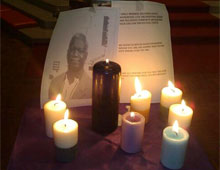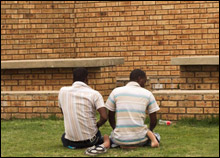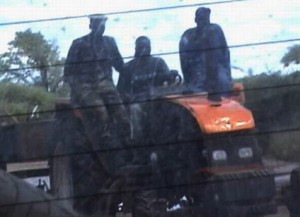
Soldiers on a tractor in an irrigation scheme, Matabeleland, March 2006.
by Dr Rory Pilossof – Post-doctoral Fellow at the University of Pretoria (January 2011)
Introduction
As a result of the government’s fast-track land reform programme, spearheaded by veterans of the country’s Liberation War, the plight of the white farmers in Zimbabwe became international headline news. Images of white farmers who were beaten, killed, exiled and driven from their homes became stock material for any coverage on the land invasions and their dramatic consequences. Such events and acts of eviction became commonly referred to as jambanja[i] as more and more farmers suffered violent confrontations on their farms. In turn, white farmers were portrayed in direct opposition to the government that they believed had sanctioned the invasions and evictions. However, this blanket portrayal of opposition is one that hides a number of more complicated dimensions to the way farmers, and in particular the Commercial Farmers’ Union of Zimbabwe (CFU), engaged with the government and tried to find solutions to the situation facing them.[ii] This paper looks at how the Union reacted to the land reforms after 2000 in order to question some of the more simplistic assumptions about white farmers’ political engagements after 2000 and how they responded to the traumas of jambanja. (Read more…)
Wed, December 1 2010 » Command agriculture, Zimbabwe Review » 1 Comment
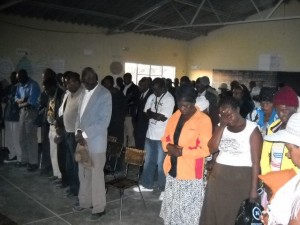
People in rural Matabeleland pray before a COPAC meeting
By Shari Eppel – Solidarity Peace Trust
I have on my desk, a silver, two-shilling, 1947, Southern Rhodesia King George VI coin, and two big copper pennies with holes in the middle, one from 1949 (Southern Rhodesia) and one from 1956 (Rhodesia and Nyasaland). These are prized souvenirs of my time in a COPAC outreach team, physical memorabilia for one of many fascinating memories that my trips into the farthest corners of rural Matabeleland have left me enriched by.
I came by these coins in a remote rural village (that shall be kept nameless to protect its inhabitants) where we had a very outspoken and ebullient meeting with around 150 people, unbelievably squashed into one school classroom. [1] It was one of those windy days that one gets in late winter, ahead of the rains – gusting dust across a dry and barren landscape. People in this area harvested very little last year, there is no grazing left now, and every living creature is hungry and waiting for the rains – desperately waiting for them. As was our usual experience, scores of people were patiently sitting in the sparse shade of the thorn trees, looking out for our convoy of four 4x4s to arrive from Bulawayo to give them their turn to speak out, to tell us what they wanted a new Zimbabwean constitution to say. We also, predictably, had the usual clutch of plain-clothes police and secret police, who had arrived in a vehicle ahead of us. (Read more…)
Mon, November 1 2010 » Constitution, Zimbabwe Review » 5 Comments
 By James Muzondidya, Research Manager – Zimbabwe Institute
By James Muzondidya, Research Manager – Zimbabwe Institute
One of the fundamental problems with both domestic and international efforts to resolve Zimbabwe’s protracted political question is their failure to appreciate the significance of race in the whole question. Preoccupied with highlighting the ruling ZANU PF’s governance failures, its authoritarianism, violation of human rights and lack of respect for democracy as well as ascertaining the party’s culpability for the economic collapse of Zimbabwe, domestic and international opponents of ZANU PF have both failed to grapple with the racial complexities of the Zimbabwean crisis and to understand why Zimbabwe’s seemingly straightforward political challenge has taken so long to resolve. At the same time, both critics and admirers of ZANU PF have not managed to explain why ZANU PF has remained in power for so long when all the political and economic odds seem to be against it. (Read more…)
Wed, October 13 2010 » Zimbabwe Review » 4 Comments
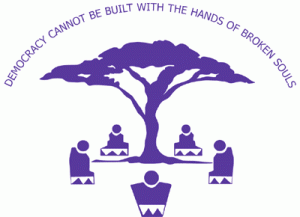 Over the past month the Trust has placed a series of essays on various aspects of Zimbabwean politics on its website. The aim of this initiative is to open up the intellectual debates on current politics in the country, and to provide more extended discussions around key issues of central concern to the Trust, such as the Constitutional Debate, Transitional Justice, Human Rights issues, National Healing, Security Sector Reform and broader debates on development questions. Thus far we have featured a numbers of articles in these areas by Zimbabwean intellectuals, who have agreed to provide short versions of their more extended research as a way of both contributing to the debates and signaling ongoing work in various areas and covering different disciplines.
Over the past month the Trust has placed a series of essays on various aspects of Zimbabwean politics on its website. The aim of this initiative is to open up the intellectual debates on current politics in the country, and to provide more extended discussions around key issues of central concern to the Trust, such as the Constitutional Debate, Transitional Justice, Human Rights issues, National Healing, Security Sector Reform and broader debates on development questions. Thus far we have featured a numbers of articles in these areas by Zimbabwean intellectuals, who have agreed to provide short versions of their more extended research as a way of both contributing to the debates and signaling ongoing work in various areas and covering different disciplines.
SPT has decided to include such interventions under a new section of the website known as the Zimbabwe Review. (Read more…)
Wed, October 13 2010 » Press Releases » Leave a comment
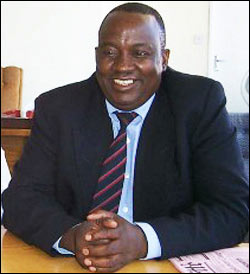
Gibson Sibanda
Gibson Jama Sibanda was born in Filabusi in 1944, a year before the momentous strike on the Railways in what was then Southern and Northern Rhodesia in 1945, a sector in which Sibanda would learn and develop the trade unions skills that would serve him so well in later years. He attended Mzinyathini Primary in Esigodini district, and Tegwane Secondary, where he attained his ‘O’ level certificate. In later years he advanced his educational level through the attainment of a Diploma from the J.F.Kennedy School of Government, at Harvard University.
In 1969 Gibson Sibanda married Ntombizodwa in 1969, and they raised four children, Sibongile, Thandiwe, Mbuso and Zanele. His beloved Zodwa, who passed away in 2003, was a political and human rights activist in her own right. (Read more…)
Thu, August 26 2010 » Press Releases » 1 Comment





